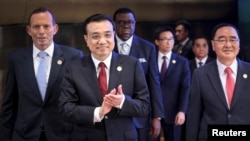HONG KONG —
As the global economy continues to struggle to recover, Asia remains a bright spot with developing countries still enjoying high rates of growth. On Thursday, at an international economic meeting in China, the country's premier said that regional integration is the way forward, for the sake of the global economy and despite regional frictions over territory.
Li Keqiang addressed an audience of businessmen and politicians from over 50 Asian countries at the opening ceremony of the Boao Forum, a regional economic meeting modeled after the World Economic Forum.
In his remarks, Li stressed the need for more cooperation and trade between countries in Asia. "In the past decade intraregional trade in Asia has expanded from $1 trillion to $3 trillion. Its share in total trade for Asian countries has increased from 30 to 50 percent. That is still far less than trade within the European Union," he said.
China has been lobbying for more infrastructure projects to connect the country with its neighbors to the South and West.
While physical transportation and energy links will help trade, China is also promoting the establishment of free trade zones to lure service and financial sector companies.
At home, Shanghai was designated as a pilot city in free trade last year. Since then, dozens of other cities have filed applications to create a similar scheme.
A regional free trade zone set up by the United States called Trans-Pacific Partnership (TPP) has so far excluded China, which is seen as not meeting the requirements of free market, labor guarantees and environmental protection.
On Thursday, Li Keqiang said that China takes an “open position” to the TPP. "As long as the TPP is conducive to global trade and an equitable and open trading environment, China is happy to see its conclusion," he said.
Li Keqiang's remarks come as China is experiencing a period of slowing economic growth. The leadership has committed itself to a radical overhaul of its economy towards a more market oriented system.
Analysts have noted that the types of reforms China is trying to implement at home are in line with the goals of regional trade pacts, such as the TPP.
"China would like to participate in the U.S.-led TPP process, so that China will not be left out in one of the largest trade zones in the future. All of that indicates that China is determined to engage in fast economic reform and restructure," stated
Li-Gang Liu, an economist at ANZ Bank in Hong Kong.
Li Keqiang acknowledged the challenges of cooperating in a region where territorial disputes routinely disrupt other areas of cooperation.
He repeated China's commitment to resolving disputes in a peaceful manner, but said that China will respond firmly to provocations that undermine peace and stability in the South China Sea.
Li Keqiang addressed an audience of businessmen and politicians from over 50 Asian countries at the opening ceremony of the Boao Forum, a regional economic meeting modeled after the World Economic Forum.
In his remarks, Li stressed the need for more cooperation and trade between countries in Asia. "In the past decade intraregional trade in Asia has expanded from $1 trillion to $3 trillion. Its share in total trade for Asian countries has increased from 30 to 50 percent. That is still far less than trade within the European Union," he said.
China has been lobbying for more infrastructure projects to connect the country with its neighbors to the South and West.
While physical transportation and energy links will help trade, China is also promoting the establishment of free trade zones to lure service and financial sector companies.
At home, Shanghai was designated as a pilot city in free trade last year. Since then, dozens of other cities have filed applications to create a similar scheme.
A regional free trade zone set up by the United States called Trans-Pacific Partnership (TPP) has so far excluded China, which is seen as not meeting the requirements of free market, labor guarantees and environmental protection.
On Thursday, Li Keqiang said that China takes an “open position” to the TPP. "As long as the TPP is conducive to global trade and an equitable and open trading environment, China is happy to see its conclusion," he said.
Li Keqiang's remarks come as China is experiencing a period of slowing economic growth. The leadership has committed itself to a radical overhaul of its economy towards a more market oriented system.
Analysts have noted that the types of reforms China is trying to implement at home are in line with the goals of regional trade pacts, such as the TPP.
"China would like to participate in the U.S.-led TPP process, so that China will not be left out in one of the largest trade zones in the future. All of that indicates that China is determined to engage in fast economic reform and restructure," stated
Li-Gang Liu, an economist at ANZ Bank in Hong Kong.
Li Keqiang acknowledged the challenges of cooperating in a region where territorial disputes routinely disrupt other areas of cooperation.
He repeated China's commitment to resolving disputes in a peaceful manner, but said that China will respond firmly to provocations that undermine peace and stability in the South China Sea.
